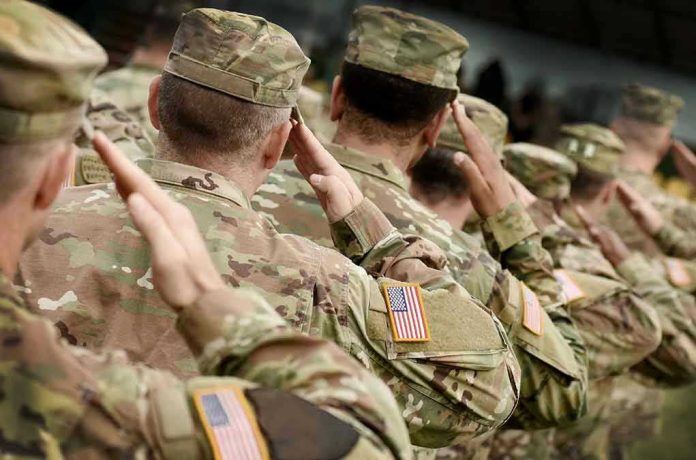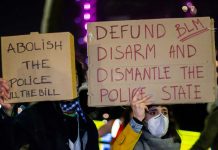
Hundreds of National Guard troops from West Virginia and other Republican-led states are now patrolling Washington, D.C., as federal authority overrides local opposition in an unprecedented crackdown—fueling fierce debate over state power, constitutional rights, and the role of the military in American cities.
Story Snapshot
- President Trump has federalized D.C. police and deployed the National Guard, joined by troops from West Virginia, South Carolina, and Ohio, to address crime and homelessness.
- The move is a federally directed initiative, not requested by D.C. officials, and has triggered protests over federal intervention and states’ rights.
- Republican governors back the deployments, framing them as necessary for public safety and restoring order, while critics warn of federal overreach and erosion of local autonomy.
- The operation sets a new precedent for interstate National Guard use in peacetime, raising constitutional questions and sparking controversy among local residents and lawmakers.
Federal Command Overrides Local Control in D.C.
On August 11, 2025, President Donald Trump issued an executive order federalizing the D.C. police force and activating 800 D.C. National Guard troops, citing the need to tackle persistent crime and homelessness in the nation’s capital. Days later, West Virginia Governor Patrick Morrisey, along with the governors of South Carolina and Ohio, announced the deployment of 300–400 National Guard troops each to Washington, D.C. This marks a rare instance of interstate National Guard deployments for routine law enforcement, rather than disaster response or major protest management. The operation is coordinated and funded by the federal government, not initiated by local D.C. authorities. As troops arrived beginning August 17, the city saw immediate protests from residents and local officials, who warned that the action undermines the city’s limited autonomy and could set a precedent for future federal interventions regardless of local wishes.
Republican state leaders have framed the deployment as a direct answer to public frustration with ongoing disorder and deteriorating city conditions, invoking themes of law and order and federal leadership. Governor Morrisey stated, “West Virginia is proud to stand with President Trump in his effort to restore pride and beauty to our nation’s capital.” Maj. Gen. James Seward of the West Virginia National Guard emphasized a commitment to supporting partners in the National Capital Region, highlighting the military’s readiness to contribute to public safety and the restoration of clean, secure environments. Federal funding covers all deployment costs, making this a high-profile example of state-federal cooperation on conservative priorities.
Local Pushback and Protests Over Federal Intervention
Despite official support from participating states, the deployments have encountered vocal opposition within D.C. itself. Local government officials, who were not consulted on the decision, argue that the federal government is overreaching its authority and sidelining the elected leadership of the District. Demonstrators have gathered in prominent locations, protesting the militarization of city streets and raising concerns about the erosion of civil liberties and democratic governance. Critics, including some legal scholars and civil liberties organizations, warn that using military force for domestic law enforcement can undermine constitutional protections and inflame existing social tensions. They also note that current crime rates in D.C. are lower than during Trump’s previous term, raising questions about the necessity and motives behind such a sweeping intervention.
Historical precedent for National Guard use in D.C. exists, such as during the 2020 protests, but those instances typically involved temporary, emergency measures rather than extended, federally mandated patrols. The present situation has reignited longstanding debates about D.C.’s lack of statehood and the limited power of local officials in the face of presidential authority. The controversy underscores the delicate balance between public safety, federalism, and local self-governance—especially in the uniquely structured capital city.
Implications for States’ Rights, Constitutional Limits, and Future Precedents
The rapid deployment of National Guard units from multiple Republican-led states to enforce federal directives in D.C. introduces new questions about the separation of powers and the constitutional limits of executive authority. Supporters argue the measure is justified to restore order, protect residents, and reverse what they see as the failures of progressive local governance. They see it as a victory for common sense, public safety, and a return to traditional values. However, opponents—both within D.C. and among national experts—warn that this move could open the door to future abuses of power, allowing any administration to bypass local control and impose military solutions to social problems. Some experts caution about “mission creep,” where military force gradually shifts from extraordinary circumstances to routine governance, potentially threatening civil liberties and the principle of limited government.
More than 700 National Guard troops from 3 GOP-led states will be deployed to DC to bolster Trump crackdown https://t.co/1DULFIVafh
— ConservativeLibrarian (@ConserLibrarian) August 17, 2025
Economically and socially, the operation’s full impact remains uncertain. While federal funding shields participating states from cost burdens, local businesses and residents may suffer from increased tension, reduced tourism, and deepening political divides. For the National Guard members involved, the mission places them in the middle of a contentious political dispute, far from traditional disaster or defense roles. As debates continue, the nation is left to grapple with the long-term consequences of federal intervention in domestic policing, the future of D.C.’s autonomy, and the boundaries of constitutional government in an era of acute partisan conflict.
Sources:
West Virginia to deploy hundreds of National Guard troops to D.C. – CBS News
West Virginia National Guard support President Trump’s initiative: Make DC Safe and Beautiful
West Virginia sends hundreds of National Guard members to Washington at Trump team’s request
US states to deploy National Guard troops to Washington DC
W.Va. National Guard to deploy as part of crime patrols in Washington, D.C.









